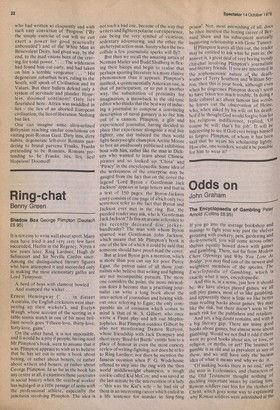Ring-chat
Benny Green
Shadow Box George Plimpton (Deutsch £6.95) It is not easy to write well about sport. Many men have tried it and very very few have succeeded, Hazlitt in the Regency, Nyren a few years later, Ring Lardner, Hugh de Selincourt and Sir Neville Cardus since. Among the distinguished literary figures who have attempted it and succeeded only in making the most elementary gaffes are Lord Tennyson: A herd of boys with clamour bowled And stumped the wicket . .
Ernest Hemingway ( . in distant Australia, the English cricketers were sharpening up their wickets'), and Evelyn Waugh, whose account of the scoring in a table tennis match in one of his most brilliant novels goes 'Fifteen-love, thirty-love, forty-love, game'.
On the other hand, it is not impossible, and it would be a pity if people, having read Mr Plimpton's book, were to assume that it was. Plimpton appears to wish us to believe that he has set out to write a book about boxing, or rather about boxers, or rather about writers and boxers, or rather about George Plimpton. In so far as the book has any centre at all, it examines those junctures in social history when the cerebral worker has indulged in a little passage of arms with the professional athlete, especially the junctures involving Plimpton. The idea is not such a bad one, because of the way that writers and fighters polarise our experience, one being the very symbol of vicarious, sedentary adventuring, and the other the archetypal action-man. Surely when the two collide a few journalistic sparks will fly?
But then we recall the amazing antics of Norman Mailer and Budd Shulberg in flexing their biceps and begin to realise that perhaps sporting literature is a more elusive phenomenon than it appears. Plimpton's method, a quintessentially American one, is that of participation, or to put it another way, the substitution of proximity for imagination, a throwback to the old-time editor who thinks that the best way of inducing a journalist to compose a convincing description of naval gunnery is to fire him out of a cannon. Plimpton, a glib and experienced journalist, having decided to place that experience alongside a real live fighter, one day induced the then world light-heavyweight champion Archie Moore to box an assiduously publicised exhibition bout with him, rather like the man in Dickens who wanted to learn about Chinese pirates and so looked up 'China' and 'Piracy' in the encyclopaedia. Some idea of the seriousness of the enterprise may be gauged from the fact that on the cover the legend 'Lord Byron v Gentleman Jack Jackson' appears in large letters and that in a text of 350 pages, the Byron-Jackson entry consists of one page of vThich only two sentences refer to the fact that Byron and Jackson ever met in the ring. But, the puzzled reader may ask, who is 'Gentleman Jack Jackson'? Is this an arcane reference to the recently deceased disc jockeybandleader? The man with whom Byron sparred was Gentleman John Jackson, which means that Mr Plimpton's book is one of the few of which it could be said that someone should have proof-read the cover.
But at least Byron gets a mention, which is more than you can say for poor Pierce Egan, the patron saint of all those journalists who believe that writing and fighting are not incompatible pursuits. The more one considers the point, the more miraculous does it become that a practising journalist can write a long book about the inter-action of journalism and boxing without once referring to Egan; the only comparable sin of omission which comes to mind is that of W. S. Gilbert, who once wrote a Faust play and left out Mephistopheles. But Plimpton outdoes Gilbert by also not mentioning Damon Runyon, whose friendship with Jack Dempsey and short story 'Bred for Battle' entitle him to a place of honour in even the most cursory review of writing-fighting; nor does he refer to Ring Lardner; nor does he mention the famous occasion when P. G. Wodehouse offered to step into the ring with the then world middleweight champion, a tough cookie called Kid McCoy, and was saved at the last minute by the intervention of a lady — 'this was the Kid's wife — he had six of them in an interesting career which ended in a life sentence for murder in Sing-Sing prison'. Nor, most astonishing of all, does he once mention the boxing career of Bernard Shaw and his subsequent mutually improving relationship with Gene Tunney. If Plimpton leaves all this out, the reader may be entitled to ask what he puts in; the r is, a great deal of very boring answer trendy chit-chat involving Plimpton's journalistic and literary friends. If you are interested in the sophomoronic nature of, the deathwishes of Terry Southern and William Styron, then this is your book, although even when he disgresses Plimpton doesn't scent to have taken.too much trouble. In doing a little cabaret act about famous last words, he leaves out the observation of Heine, who, when asked by his wife on his deathbed if he thought God would forgive him for his religious indifference, replied, 'Of course he will; that's his job'. It will be interesting to see if God ever brings himself to forgive Plimpton, of whom it has been said that he wears his scholarship lightly. How else, one wonders, would it be possible for him to wear it?


































 Previous page
Previous page